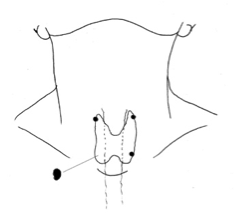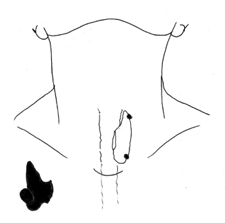When to operate?
Parathyroids are 4 glands located behind the thyroid and have the role of regulating calcium levels in the blood via Parathormone. The presence of a single healthy gland is sufficient to ensure a normal function. The most common disease is hyperfunction (Hyperparathyroidism), which causes various manifestations: an increase in calcium levels in the blood, bone demineralization (similar to osteoporosis), unexplained fatigue, depressive state, bone and muscle pain, kidney stones… Etc.
We can distinguish:
– The increase in size of the 4 glands called hyperplasia
– The increase in size of a single gland (adenoma)
– Parathyroid cancer (very rare, less than one percent of hyperparathyroidisms)
Exploration prior to the operation consists of an ultrasound of the neck and a MIBI apelled scan.
Parathyroïdectomie simple
Parathyroïdectomie subtotale
Parathyroïdectomie Totale
Chirurgie radicale pour cancer
If a small (minimally invasive) incision is not feasible, the incision is the same as for thyroid resection (5-6 cm.).
Complications
1) Recurrent nerve (also called lower laryngeal nerve):
It is a nerve that passes on either side of the neck behind the thyroid. He is still wanted, identified and protected during the operation. It controls the vocal cords, whose role is to be able to speak and close access to the lung to avoid choking when eating. A blockage of the nerve impulse (whether the nerve is intact or injured) thus causing a weak or hoarse voice is a rare phenomenon (about 5-10% of operations), not predictable and especially temporary with a recovery in a few days or weeks.
2) Changes in calcium levels after surgery
As soon as the level of parathyroid hormones has been normally restored, calcium levels will decrease. This rate depends on the activity of other healthy glands (may be dormant and not very active) and the bone that has lost a lot of calcium and will behave like a "sponge" to quickly recover what it has lost. The risk of too much calcium (hypocalcemia) is monitored by a check-up twice a day after the operation. This hypocalcemia can occur in 5-10% of cases and the vast majority of these are a temporary problem (a few days to a few weeks). This can be manifested by tingling of the hands and face, rarely cramps. We ask you to report such an event so that it is quickly relieved (injection or calcium tablet). Substitution is sometimes necessary (Calcium and vitamin D) for several days after discharge from hospital.
Benefits of surgery and post-operative follow-up:
The purpose of the operation is to restore a normal amount of parathyroid with a normal calcium level. There is normally no reason to monitor the neck after a parathyroidectomy.




